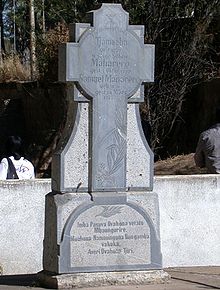- Maharero
-
 Maharero
Maharero
Maharero (also:Kamaharero, ca. 1820-7 October 1890) was one of the most powerful paramount chiefs of the Herero people in South-West Africa, today's Namibia.
Contents
Biography
Maharero, also known as Kamaharero, was born about 1820 at Okahandja. In 1843 he went with his father Tjamuaha to Windhoek to stay with Jonker Afrikaner, Captain of the Oorlam Afrikaners. Tjamuaha was an ally of Jonker Afrikaner until his death in 1861, albeit in a subordinate position.[1]
Herero-Orlam hostilities
When Jonker Afrikaner died, he was succeeded by Christian Afrikaner. Maharero rebelled against the Afrikaners. They subsequently attacked Maharero's men at Otjimbingwe on 15 June 1863, a battle in which Christian Afrikaner was killed.[1]
Christian's successor, Jan Jonker Afrikaner did not want to allow the Hereros to escape from his overlordship, and so hostilities continued for several years.
Some traders at Otjimbingwe, notably C.J. Andersson and Frederick Green, considered that the war was bad for trade, and took a hand in organising and leading the Herero army. Green led a force that captured most of the Oorlams cattle, and on 1864-06-22 there was a decisive battle in which Jan Jonker Afrikaner's forces were defeated.
Dispensing with the services of the traders, Maharero won more battles, and took control of Damaraland, and even sent his forces into Namaqualand. Eventually in 1870 a peace was brokered by missionary Carl Hugo Hahn of the Rhenish Missionary Society.
In the decade that followed, many more white traders entered Damaraland, mostly from the Cape Colony. Maharero complained to the governor of the Cape Colony about Boers entering the eastern part of the territory. The Cape government sent the Palgrave Commission, and later annexed Walvis Bay in 1878, though this was not actually part of Maharero's territory.
In 1880 there were renewed hostilities between Maharero and Jan Jonker Afrikaner. What was originally a dispute over grazing escalated into a pogrom against all Nama living in Maharero's territory, and over 200 were killed. One who escaped with his life was Hendrik Witbooi, who thereafter led the opposition to Maharero.
Also faced with repeated attacks by the ǀKhowesin, a subtribe of the Khoikhoi under Hendrik Witbooi, Maharero signed a protection treaty with Imperial Germany's colonial governor Göring on 21 October 1885 but did not cede the land of the Herero. Due to lack of German support against Witbooi Maharero renounced this treaty in 1888 and reopened negotiations with the government of the Cape Colony. But by that time the Scramble for Africa was under way, and the Cape Colony government was powerless to intervene, even if it had wanted to. The European powers had by then recognised South West Africa as a German sphere of influence. Maharero reaffirmed the treaty with the Germans in May 1890.[2]
Maharero died on 7 October 1890 in Okahandja. Historian Heinrich Vedder claims that his main wife Kataree poisoned him in order to prevent him from changing his mind on who his successor should be. His eldest son Samuel Maharero succeeded him as chief of the Herero.[3]
References
Notes
- ^ a b Dierks, Klaus. "Biographies of Namibian Personalities, T. Entry for Ua Tjirwe Tjamuaha". http://klausdierks.com/Biographies/Biographies_T.htm. Retrieved 24 June 2010.
- ^ Dierks, Klaus. "Biographies of Namibian Personalities, M. Entry for Maharero". klausdierks.com. http://klausdierks.com/Biographies/Biographies_M.htm. Retrieved 10 June 2011.
- ^ Vedder 1997, p. 662.
Literature
- Vedder, Heinrich (1997) (in German). Das alte Südwestafrika. Südwestafrikas Geschichte bis zum Tode Mahareros 1890 [The old South-West Africa. South-West Africa's history until Maharero's death 1890] (7th ed.). Windhoek: Namibia Scientific Society. ISBN 0 949995 33 9.
- Dictionary of South African Biography, Vol II. Pretoria: Human Sciences Research Council. 1972. ISBN 0-624-00369-8.
- Gewald, Jan-Bart (1999). Herero heroes: a socio-political history of the Herero of Namibia 1890-1923. Oxford: James Currey. ISBN 0-85255-749-3.
Tjirwe (before 1842) · Tjamuaha (1842–1861) · Maharero (1861–1890) · Samuel Maharero (1890–1917) · Hosea Kutako (1917–1970) · Clemens Kapuuo (1970–1978) · Kuaima Riruako (1978–) Categories:
Categories:- Namibian people
- 1890 deaths
- People from Otjozondjupa Region
Wikimedia Foundation. 2010.

